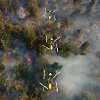We can look at this two ways.
You can pout today because it is the shortest day of the year thanks to the winter solstice forcing the sun to rise late and then make a hasty exit with an early sunset.
Or, you can rejoice that Christmas is just four days away and every day from now on will get a little lighter and brighter as the Earth ever-so-gradually tilts back toward the sun.
Winter solstice is an astronomical term referring to the exact moment the North Pole is at maximum tilt away from the sun.
Today, in the Northern Hemisphere, that moment is 7:27 pm.

Of course, in the Southern Hemisphere, it means the start of summer and the longest day of the year -- the exact opposite of what we're enduring.
But, let's not get started on that.
Back to the winter solstice.
It's nature's start of winter as the sun travels its shortest path in the sky, thus the least amount of daylight and the longest night.
This is where we have to address the difference between astronomical winter and meteorological winter.
Betcha most people think we've already been in winter the past few weeks because it's December and all.
And, they're right.
Meteorological winter -- the season weather forecasters such as Environment Canada recognize -- is Dec. 1 to the end of February.
Having it tidily divided into three full months makes it easier to keep and compare monthly weather statistics.
Astronomical winter is based on the science of celestial objects, space and the physical universe, of which the sun is the marquee player.
Astronomical winter runs from today until March 19, which is spring equinox in the Northern Hemisphere when the sun shines directly on the equator and the Earth's axis is neither tilted toward or away from the sun.
Even with astronomical winter coming later than meteorological winter, BC isn't getting very winter-like weather.
The forecast through the holidays is milder than usual temperatures and no snow -- so a green Christmas.

"It looks like it will cool down for Christmas and there will even be some below zero temperatures, but it's also going to dry out at the same time, so likely no snow," said Environment Canada meteorologist Alyssa Charbonneau.
"The long-range forecast indicates a milder winter than usual with a El Nino weather pattern. That's not to say we we can't get any cold snaps and we're still likely to get some snow eventually."
While the winter solstice happens at the same time all over BC at 7:27 tonight, sunrise and sunset and thus hours of daylight today can vary in the province depending on latitude.
The following list shows those subtle differences.
Kelowna (49.88 degrees north)
- sunrise: 7:53 am
- sunset: 3:58 pm
- daylight: 8 hours, 5 minutes, 28 seconds
- civil morning twilight: 7:14 am to 7:53 am (when the sun has yet to rise, but there's still enough light to do most outdoor activities)
- civil afternoon twilight: 3:58 pm to 4:37 pm (when the sun has set, yet there's still enough light to do most outdoor activities)
Penticton (49.48 degrees north)
- sunrise: 7:51 am
- sunset: 4 pm
- daylight: 8 hours, 9 minutes, 2 seconds
- civil morning twilight: 7:13 am to 7:51 am
- civil afternoon twilight: 4 pm to 4:38 pm
Kamloops (50.67 degrees north)
- sunrise: 8 am
- sunset: 3:58 pm
- daylight: 7 hours, 57 minutes, 57 seconds
- civil morning twilight: 7:21 am to 8 am
- civil afternoon twilight: 3:58 pm to 4:37 pm
Vernon (50.27 degrees north)
- sunrise: 7:54 am
- sunset: 3:56 pm
- daylight: 8 hours, 1 minute, 53 seconds
- civil morning twilight: 7:15 am to 7:54 am
- civil afternoon twilight: 3:56 pm to 4:34 pm
Victoria (48.41 degrees north)
- sunrise: 8:02 am
- sunset: 4:20 pm
- daylight: 8 hours, 18 minutes, 34 seconds
- civil morning twilight: 7:25 am to 8:02 am
- civil afternoon twilight: 4:20 pm to 4:57 pm
Prince George (53.91 degrees north)
- sunrise: 8:27 am
- sunset: 3:50 pm
- daylight: 7 hours, 23 minutes, 18 seconds
- civil morning twilight: 7:43 am to 8:27 am
- civil afternoon twilight: 3:50 pm to 4:34 pm

















